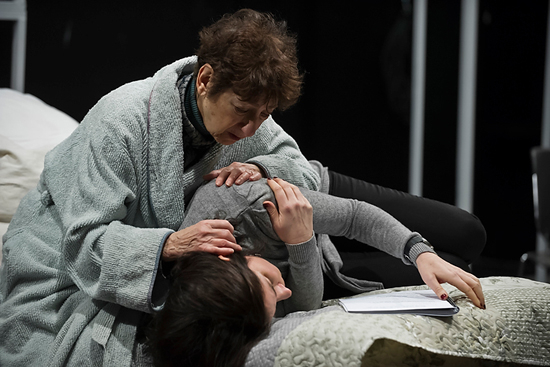
(© Kalman Zabarsky)
Helen Bastion’s mind may be going, but she is not going to follow it gentle into that good night. The protagonist of Peter M. Floyd’s play, Absence, seen in a lovely world premiere by Boston Playwrights' Theatre, is a tough cookie missing a few chips as she heads past 75. She has been forgetting things; she has found herself lost in her own neighborhood. But she does not want to talk about it with meek husband David or disappointing daughter Barb, both of whom she has spent decades cowing. Clearly Helen is in the early stage of dementia, not to mention the earliest stage of grief as charted by Elisabeth Kübler-Ross: denial. Floyd’s play, which moves from family interworking through interior whimsy toward something almost magisterial, finds touching, interesting ways through which to dramatize Helen’s inevitable shedding of self. With its proud, sour heroine and end-of-life trajectory, the piece is reminiscent of Margaret Edson’s Wit with a brain rather than a body coming apart and Mr. Marmalade (in the form of an antic imaginary doctor) standing in for John Donne.
In the beginning, the play might be mistaken for one more aging-parent medical drama, except that Helen’s love affair with her waning memory is so precisely evoked by the opening monologue in which she recalls her father’s return from World War II. It is only after we have listened to this story that Dave and Barb enter to inform Helen that she has told it twice in five minutes. Things tip toward the familial and mundane then, with Helen berating Dave for his weakness and Barb for failing to become a lawyer. But the filmy abstract setting by Tom Gleeson, an arrangement of white curtains and panels with stacks of packing boxes to suggest that Helen is on an inexorable move, helps the play to float above the realm of domestic drama. And soon Helen’s interior difficulties are being dramatized by our hearing not what the other characters must be saying but what Helen is hearing: nonsense strings of English rather like the language Tom Stoppard created for Dogg’s Hamlet. And to the cast of real relatives and doctors is added a teasing, seductive figure only Helen can see: the garishly accoutered Dr. Bright, whose opinion regarding memory is that one may be better off without it.
As her mind deteriorates, the once critical Helen finds herself obsessed with making connection, particularly with the daughter she has spent years running down for failing to fulfill her mother’s dreams and instead settling for marriage and a daughter of her own. Still difficult though increasingly vulnerable, Helen fears it may be too late to find the means to make amends. But the final confrontation between mother and daughter, with Barb’s sense of loss expressed in angry arias of gibberish, is very moving — and exquisitely acted by Anne Gottlieb and visiting Broadway, film, and Homeland vet Joanna Merlin. Merlin’s Helen is prickly but understated; you can feel the fight eke out of her, and the diminishment seems both natural and painful. Playing both a daughter and a mother, Gottlieb plugs into the neediness and aggression on both sides of that equation.
Megan Schy Gleeson helms the production, with its graceful moving panels behind which shadows can be seen to dance. And the staging is both airy and abstract enough to shoo away intimations of television drama in favor of metaphor. David Wilson supplies the suggestive, musical sound design, Rachel Padula Shufelt the character-appropriate costumes. Dale Place is a patient if slightly bland David (but that’s how Helen sees him). Boston University sophomore Beverly Diaz, as Barb’s teenage daughter, is persuasive in a strange, emotional scene in which she confronts her possibly suicidal grandmother while wearing balloon pajamas and slipper socks. Cheryl D. Singleton competently tends to the medical and institutional figures. And as the frolicking Dr. Bright, waggling goggle glasses and sporting vivid pastels beneath his lab coat, Bill Mootos is both beckoning and creepy — rather like death.








